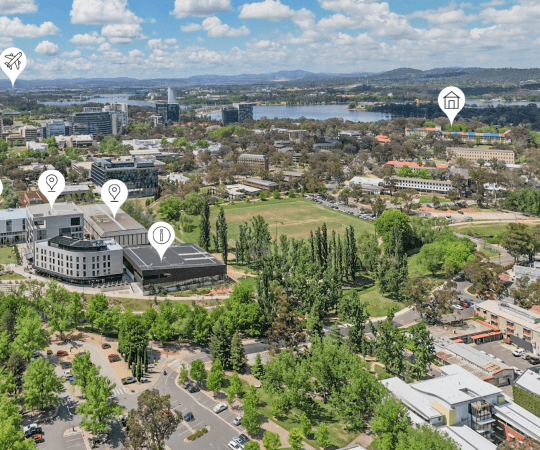
Rural Students — What do they look for in a Uni?
We get to talk with a lot of students whilst developing brands for universities and residential colleges. Recently we had the pleasure of talking with a student that moved from regional Australia to study in the city. The following contains snippets of their experiences, both good and bad, and how they transitioned from the country to the hubbub of city life.
“I was born and bred in regional NSW. In my last year of high school I was looking forward to the day that I could finally leave my rural surroundings and head off to the ‘big smoke’ to start the next chapter of life. This move was important to me, it signified that I was ready, as an adult, to leave the nest and experience the freedom I was longing for.
I wanted to study photography at university and was looking at doing a four-year full-time Bachelor of Visual Arts, majoring in Photography. I applied to all the Universities that offered that course in NSW and the ACT.
To my surprise and amazement I was accepted into three universities. I wasn’t sure which university was better for me, so I decided to visit each one and see, for myself, what the location was like, what facilities were available to help somebody transition from the country and whether I could afford to attend on my budget. I was also keen to understand which course offered the best degree. The locations of the three universities that I had to choose from were Albury-Wodonga, Canberra and Western Sydney.
Albury’s teaching staff were extremely friendly and helpful, they made me feel a part of a greater family. The course offerings ticked all the boxes and my budget would enable me to live there quite comfortably. The only downside was that it was a little too remote for my liking, I was trying to escape the country and was looking for something a little farther from home.
I always had my heart set on Sydney for studying. As a child we visited Sydney from time-to-time, I loved the hustle-and-bustle and the seemingly endless things to do and see. Unfortunately the university that I was accepted into was in Western Sydney — it was very old, industrial and quite removed from the city. It didn’t really live up to the glamour of the Sydney that I fell in love with, even though the course and people were perfect. Cost of living was much higher there too, it far exceeded my living expenses.
My final option was Canberra. It wasn’t quite Sydney, but it was close enough. The course was excellent, the facilities were modern and inviting and the people friendly. The residential colleges were a little out of my budget, this was mitigated by renting in a shared apartment, the cost of living was very affordable too. So I decided on Canberra”.
What could the universities have done to help you better transition?
“A good induction pack is a must. I really needed information on housing options, managing my budget, social groups, transport and student support services.
At times I felt I really had to dig for the information, it was daunting and time-consuming. Part of the reason why it seemed daunting was the amount of material that I was given to sift through. It would have been nice to have a simple overview that gave me this information quickly and conveniently and pointed me in the right direction if I wanted more information.
A lot of the information that was provided didn’t seem to take the viewpoint of a lost, bewildered student. It felt like I was wading through a communication swamp — too much information, too much marketing talk.
Studying at a university is a major life-changing decision for a rural person. It was obvious that international students were high priority in the marketing material, but us country folk seemed an after thought. We need attention too!
The tone of the text sometimes left me feeling intimidated. It was like a stern person was telling me what to do, rather than thoughtfully guiding me. This may seem like a small thing, but I remember feeling I needed assurance at every step of my journey”.
University marketing challenges
It comes as no surprise that within a target audience there are always sub-groups that have their own particular needs and viewpoints.
Part of the reason we chose to share this student’s experience was to highlight the fact that rural people struggle with integrating as much as city-based and international students — but for differing reasons. Moving to the city exposes a rural-based person to a more stressful way of living than they’re accustomed to — they suffer a culture shock.
University budgets are finite and the resources produced need to be created on shrinking budgets while catering to differing culture bases. Is there a way that you can communicate to an existing sub-group that is currently being overlooked in your marketing material?
Staying in touch with students is important. How you gather your research is equally important, it forms the basis for the development of meaningful material. It’s not uncommon for university management to make assumptions on what future students need without doing the research.
It’s easy to keep producing the same marketing material each year without giving thought to its effectiveness, so here’s a challenge for you:
Is there a way that your existing marketing materials can be modernised? Is there a better way of getting your message out there while staying within the current budget? Just because you’ve communicated with students the same way for the last 10 years doesn’t mean you should keep doing that. Universities are renowned for lateral thinking, don’t be intimidated by shrinking budgets, they provide the opportunity to rethink, revitalise and reconnect.
-
Because I believe in Colleges and Halls of Residence I often try to encourage (mainly international) students to consider living near or on campus in student housing. Every time I get the reply "they're too expensive". Whether that's true or not it shows that that's the message that is "out there" and Colleges and Halls need to think about that. How they could do it is a big ask because I am sure fees are kept to the minimum. Perhaps it comes down to how advertising is done in the big wide world.








Comments 1